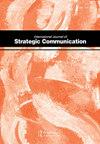间接互惠的协调:策略沟通理论与社会心理学、社会学和人类学的研究成果
IF 1.9
Q1 COMMUNICATION
International Journal of Strategic Communication
Pub Date : 2023-05-27
DOI:10.1080/1553118x.2022.2159413
引用次数: 2
摘要
摘要本文对间接互惠的概念及其与战略传播理论的关联进行跨学科的综合与协调。由进化生物学家确定并命名的间接互惠,其最简单的形式是当一个实体在没有直接回报的前景或期望的情况下使另一个实体受益时启动的资源获取过程。这一行为提高了初始实体的声誉,并导致其他观察或了解原始行为的实体的互惠利益。进化生物学和经济学的研究表明,声誉驱动的间接互惠可以导致持久的资源交换关系。因此,间接互惠对声誉管理、资源获取和企业社会责任等战略沟通的基础都有影响。本研究旨在扩大知识,在战略沟通,间接互惠的原因和方法通过检查和综合相关学科的研究社会心理学,社会学和人类学。它对间接互惠的一致性的贡献包括解释性理论,如社会交换理论和代价信号理论,以及二阶、三阶和扩展间接互惠的实际工作。披露声明作者未报告潜在的利益冲突。本文章由计算机程序翻译,如有差异,请以英文原文为准。
Toward Consilience on Indirect Reciprocity: Strategic Communication Theory and Findings from Social Psychology, Sociology, and Anthropology
ABSTRACTThis article pursues interdisciplinary synthesis and consilience regarding the concept of indirect reciprocity and its relevance to strategic communication theory. Identified and named by evolutionary biologists, indirect reciprocity in its simplest form is a resource-acquisition process initiated when one entity benefits another entity without the prospect or expectation of direct return. This action enhances the reputation of the initial entity and leads to reciprocal beneficence from other entities that have observed or learned of the original action. Research in evolutionary biology and economics has shown that reputation-driven indirect reciprocity can lead to enduring resource-exchange relationships. Indirect reciprocity thus has implications for such basics of strategic communication as reputation management, resource acquisition, and corporate social responsibility. This study seeks to expand knowledge, within strategic communication, of the whys and hows of indirect reciprocity by examining and synthesizing relevant research from the disciplines of social psychology, sociology, and anthropology. Its contributions to consilience regarding indirect reciprocity include explanatory theories such as social exchange theory and costly signaling theory and such practical workings as second-order, third-order, and extended indirect reciprocity. Disclosure statementNo potential conflict of interest was reported by the author(s).
求助全文
通过发布文献求助,成功后即可免费获取论文全文。
去求助
来源期刊

International Journal of Strategic Communication
Social Sciences-Sociology and Political Science
CiteScore
3.40
自引率
0.00%
发文量
39
期刊介绍:
The International Journal of Strategic Communication examines the philosophical, theoretical, and applied nature of strategic communication, which is “the purposeful use of communication by an organization to fulfill its mission.” IJSC provides a foundation for the study of strategic communication from diverse disciplines, including corporate and managerial communication, organizational communication, public relations, marketing communication, advertising, political and health communication, social marketing, international relations, public diplomacy, and other specialized communication areas. The IJSC is the singular forum for multidisciplinary inquiry of this nature.
 求助内容:
求助内容: 应助结果提醒方式:
应助结果提醒方式:


